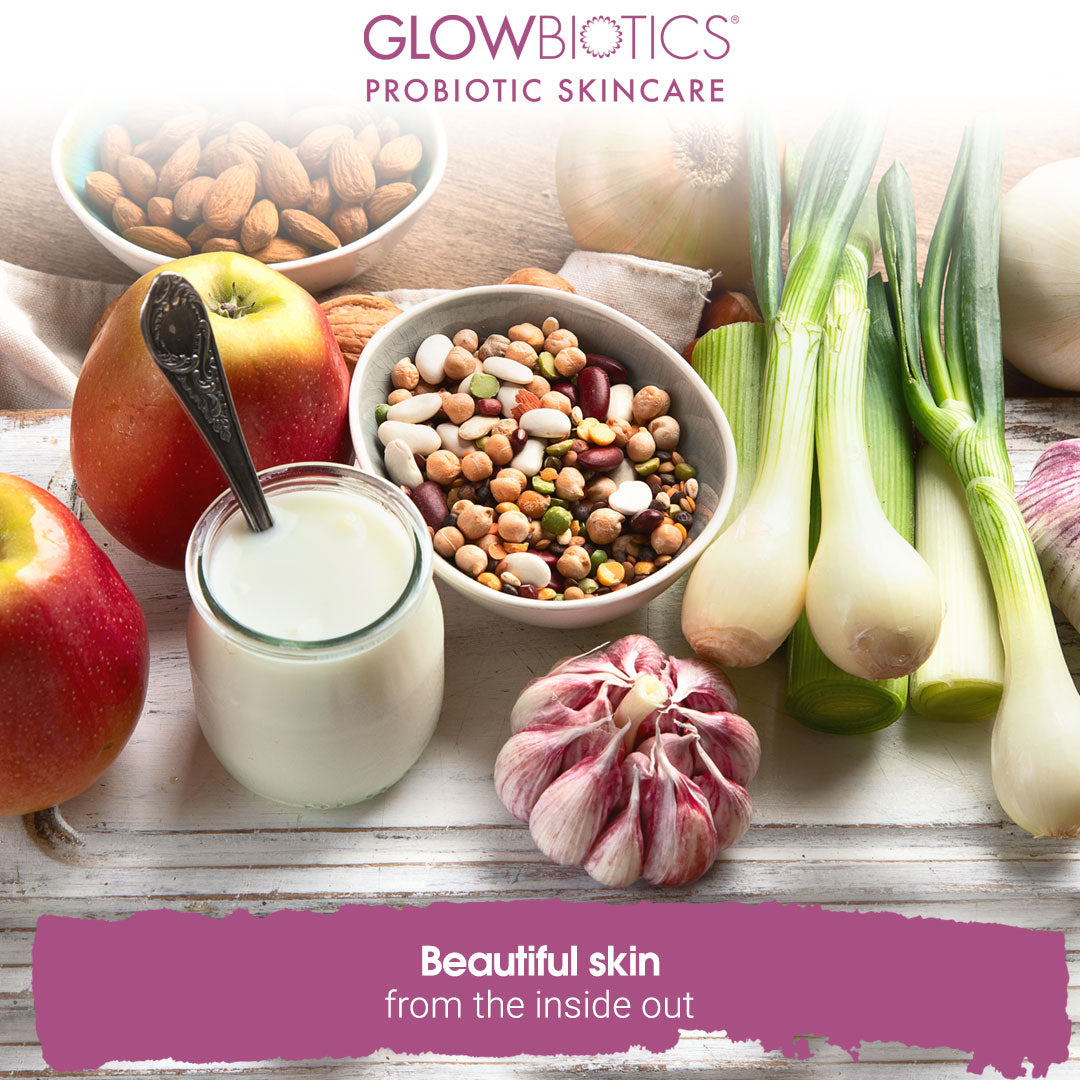
How to Have Beautiful Skin from the Inside Out
Share
How you take care of your internal health plays a vital role in how you look on the outside, as well. Just as the body needs the nutrients absorbed by the GI tract such as prebiotics and probiotics, so does your skin. Skin is the largest organ of your body and it takes the biggest toll. From environmental toxins, sun damage, aging and stress, the skin is constantly under attack. Just as external environmental forces play a role, free radicals and too much bad bacteria attack the skin internally. This onslaught of free radical damage, both inside and out, can cause an increase in wrinkles, eczema, blemishes and premature aging.
The focus of healthy skin from the inside out has taken center stage over the past 10 years with the growth in popularity of both prebiotic and postbiotic supplements. Although the science of using these beneficial bacterias topically has been questioned up until recent years, the skincare industry is finally catching up with trend and formulating viable and effective products that offer real results.
Inside Skin Health
In addition to oral prebiotic and postbiotic supplements, the addition of foods and drinks rich in these active bacterias has exploded. One of the most trendy, yet beneficial ways to get your daily intake is Kombucha. Kombucha is a fermented food, much like cultured yogurt, cheese, kefir, kimchi and sauerkraut. Traditionally a carbonated drink with live micro-organisms and is made by brewing together sugar, black or green tea, liquid from a previous batch and the SCOBY, short for symbiotic culture of bacteria and yeast. You may also know SCOBY by its popular nickname "mother," this is because it reproduces during fermentation.
During the fermentation process, the yeast in the SCOBY breaks down the sugar in the tea and releases probiotic bacteria. Kombucha becomes carbonated after fermentation, which is why the drink is fizzy.
Kombucha has been around for nearly 2,000 years. It was first brewed in China and then spread to Japan and Russia. It became popular in Europe in the early 20th century. Sales in the United States are on the rise because of its reputation as a health and energy drink. For more on Kombucha click here.
Other prebiotic and probiotic-rich foods such as Kefir have grown in popularity as well. The name Kefir is derived from the Turkish word keyif which means "feeling good" after consumption. This fermented dairy product is very similar to yogurt. It is a unique combination of kefir "grains" (a combination of yeast and bacteria) and goat's milk that's high in lactobacilli and bifidobacteria. It's also rich in antioxidants. For those who are sensitive to dairy or lactose intolerant, coconut kefir, a non-dairy version, is also delicious and equally beneficial.
Keep in mind that gut health does not always need to be trendy. Foods such as yogurt, sauerkraut and pickled fruits and vegetables are always a good go-to for your daily prebiotic and postbiotic fix.
Outside skin health
Topical prebiotics and probiotics work by balancing the symptoms from inflammatory induced skin conditions such as the above mentioned wrinkles, eczema, blemishes and premature aging. Topically they mimic a wound-healing response without being overly aggressive to the skin. They also stimulate the action of live microorganisms, balancing the skin's good and bad bacteria, thus resulting in healthy and balanced skin. The most viable probiotics in skincare currently seem to be derived from Lactobacillus Lysate, which in actuality is a "postbiotic". This fermented probiotic enzyme reduces inflammation and redness while stimulating collagen and elastin. It also offers a beneficial "shield" supporting and strengthening the skins microbiome. Other popular and effective probiotics used in skincare include Saccharomyces, Rice and Sucrose Ferment Filtrate. Many skincare lines jumping on-board the probiotics skincare wagon will choose one or possibly two of these beneficial bacterias for their formulations. GLOWBIOTICS uses an exclusive blend of these four bacterias, offering even more effective results.
The takeaway
Remember, good gut health contributes to good skin health and both prebiotics and probiotics contribute to both. So including these nutrient-rich bacterias into your diet as well as your skincare routines will help to balance the skin, support the microbiome and ultimately improve skin strength.
